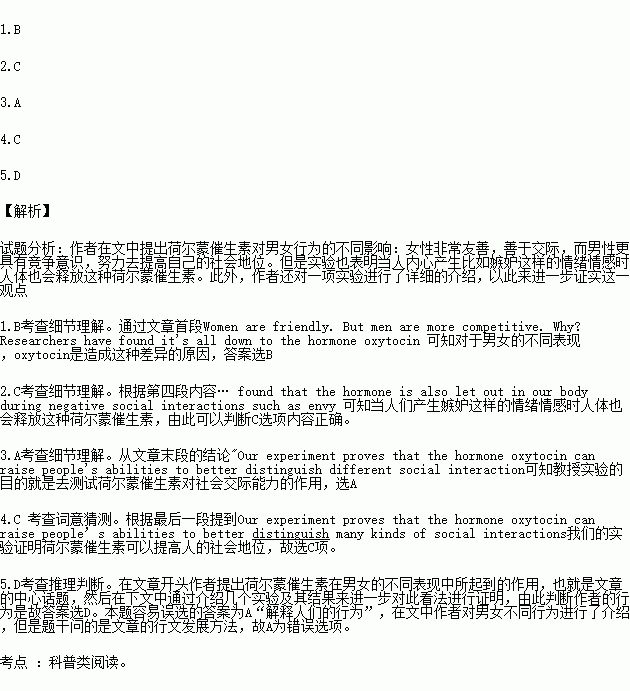题目内容
Women are friendly. But men are more competitive. Why? Researchers have found it's all down to the hormone oxytocin (荷尔蒙催生素). Although known as the love hormone, it affects the sexes differently.
“Women tend to be social in their behavior. They often share with others. But men tend to be competitive. They are trying to improve their social status,” said Professor Ryan.
Generally, people believe that the hormone oxytocin is let out in our body in various social situations and our body creates a large amount of it during positive social interactions (互动) such as falling in love or giving birth.
But in a former experiment Professor Ryan found that the hormone is also let out in our body during negative social interactions such as envy.
Further researches showed that in men the hormone oxytocin improves the ability to recognize competitive relationships, but in women it raises the ability to recognize friendship.
Professor Ryan’s recent experiment used 62 men and women aged 20 to 37.
Half of the participants(参与者)received oxytocin. The other half received placebo (安慰剂).
After a week, the two groups switched with participants. They went through the same procedure with the other material.
Following each treatment, they were shown some video pictures with different social interactions. Then they were asked to analyze the relationships by answering some questions. The questions were about telling friendship from competition. And their answers should be based on gestures, body language and facial expressions.
The results indicated that, after treatment with oxytocin, men’s ability to correctly recognize competitive relationships improved, but in women it was the ability to correctly recognize friendship that got better.
Professor Ryan thus concluded: “Our experiment proves that the hormone oxytocin can raise people’s abilities to better distinguish many kinds of social interactions. And the behavior differences between men and women are caused by biological factors (因素) that are mainly hormonal.”
1.What causes men and women to behave differently according to the text?
A. Placebo. B. Oxytocin.
C. The gesture. D. The social status.
2.What can we learn from Professor Ryan's former experiment?
A. Oxytocin affects our behavior in a different way.
B. Our body lets out oxytocin when we are deep in love.
C. Our body produces oxytocin when we feel unhappy about others’ success.
D. Oxytocin improves our abilities to understand people's behavior differences.
3.Why did Professor Ryan conduct the recent experiment?
A. To test the effect of oxytocin on the ability to recognize social interactions.
B. To know the differences between friendship and competition.
C. To know people’s different abilities to answer questions.
D. To test people’s understanding of body language.
4.The underlined word “distinguish” has the closest meaning to ______.
A.accept B.discover C.differ D.explore
5.The author develops the text by______.
A. explaining people’s behaviors
B. describing his own experiences
C. distinguishing sexual differences
D. discussing research experiments
用所给短语的适当形式填空,其中两项是多余的。
have fun with feast one’s eyes on play tricks on in memory of keep one’s word remind…of… attach….to break up pay attention to turn up look forward to set off for |
1.Our government set up a museum________________the people who died in the war.
2.___________________each other on April Fool’s Day is not our custom that we shouldn’t advocate.
3.Our English teacher is so busy with his work that he spends little time __________________
his own child.
4.The tourist _________________the breathtaking scenery of the West Lake in spring and forgot to go home.
5.We________________ Torreya Grandis Ridge with our teachers’ accompany on April 9.
6.The old picture_________me_________the sweet memory at university.
7.I promised to give my daughter a gift and I must _______________.
8.My mother often _________the importance _________being an upright person.
9.It was half past seven in the morning and one of my classmates finally________________at the school gate.
10.The day I have been comes at last.

